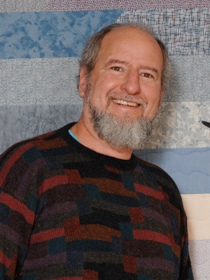
On Friday, Karl Reinhard sat in his Hardin Hall lab with doctoral candidate Johnica Morrow, reflecting on his career as a professor and researcher and attempting to answer one question: Why has he made the students he teaches such an important part of his role as a professor of environmental archaeology and forensic science, as a Fulbright Scholar who has taught abroad and as a paleopathology researcher.
Short answer: It’s what you do.
But for the nine current and former students who nominated him for the Eve Cockburn Mentorship Award from the Paleopathology Association, not all professors do, and that’s why it is such a big deal that Reinhard earned the award for his role as a mentor.
“(Dr. Reinhard) goes beyond the call of duty for both students and colleagues, yet despite their monumental impact, his efforts remain largely unacknowledged,” Morrow wrote in her nomination letter. “It is a testament to his dedication to the field that he appears content to have functioned as a conduit for the success of others without any formal acknowledgement.”
Those who nominated him, from as far away as Brazil, all echoed that thought.
“Dr. Reinhard avoids talking about himself, choosing instead to focus his energies on mentoring the next generation of scholars who will have to fill the very large void his retirement will leave in the fields of paleoparasitology and paleoecology,” SNR masters student Rebecca Bevans wrote. “It seems only appropriate that he should receive this award, nominated by his students and junior colleagues, as he would never choose to give himself the spotlight he deserves.”
The award was announced at the association's meeting April 12 in Atlanta. It is an award given out every other year to a deserving member. The Paleopathology Association was formed in 1973 by U.S. and Canadian scientists, and the award has been given out since 2008.
Paleopathology is the study of ancient diseases in humans and animals.
Just as time isn’t a factor that hinders his research, distance isn’t one that hinders his ability to mentor.
“I have now known Karl for 19 years, and he has been an exemplary teacher, advisor, co-author and friend,” said Elizabeth Martinson Goodman, who met Reinhard in 1997 when she was a graduate student at the University of New Mexico. “Of the many professors with whom I worked, I must say that Karl has done more to see that I succeed than any other. This is quite a testament, considering we have had a limited amount of face time; almost our entire relationship has played out via email.”
- Shawna Richter-Ryerson, Natural Resources; UNL Today contributed to this report
More details at: http://go.unl.edu/ydux